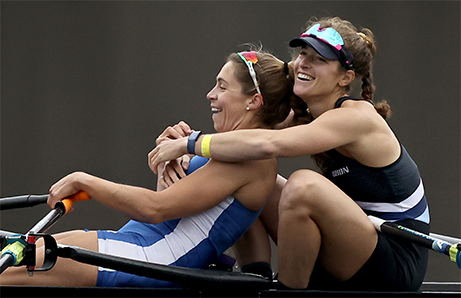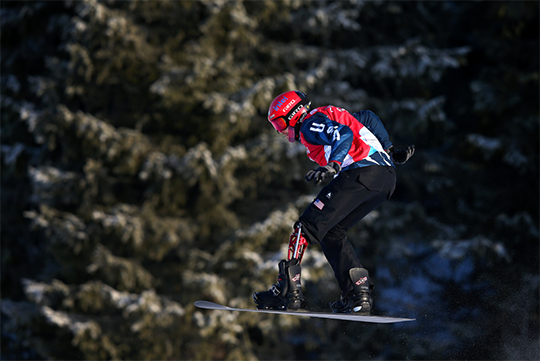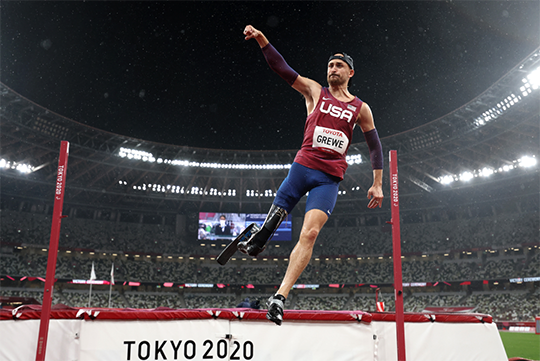ATHLETE EXCELLENCE
WELL-BEING
SCROLL FOR MORE


ATHLETE EXCELLENCE
WELL-BEING
For Olympic and Paralympic athletes, though sport is a core part of their identity, they are also so much more. They are parents, caregivers and community members – and often working other jobs. We believe when athletes feel valued, understood and supported on a personal level, they are better positioned to achieve excellence. In 2021, we worked to promote athletes’ well-being through mental health, empowerment and efforts to listen to athlete feedback and respond to their needs.

Eight-in-10 athletes are satisfied with their overall well-being*
*Based on 747 athlete responses of 7,183 athletes invited to participate in our annual survey conducted by C+R Research
Keeping Athletes Mentally Healthy
The USOPC takes a whole-person view of health, recognizing that mental well-being is of equal priority to physical health. We must have empathy for and rally behind athletes who are under pressure from intense training requirements and performance expectations, while also looking to excel in their day-to-day lives outside of training and competition.
Normalizing Mental Health
Discussing emotional or mental struggles has long had a stigma in sports, with athletes often being told to “tough it out.” At the USOPC, we’re dedicated to normalizing mental health not only in word, but also in action.
Mental Health Support
Ahead of the Tokyo and Beijing Games, we worked with the International Olympic Committee Mental Health Working Group to incorporate mental health screenings into health histories and share data for more than 1,300 athletes, resulting in one of the largest data sets in existence around the topic. Our Director of Mental Health also collaborated closely with counterparts from Australia, Canada, Denmark and Great Britain on important issues.
At the Tokyo Games, through support from the U.S. Olympic & Paralympic Foundation and USOPC Mental Health Ambassadors, we were able to deploy mental health professionals on the ground for the first time, supporting 267 encounters with Team USA athletes. With most athletes competing without their normal support systems, including family and fans, mental health services were even more essential.
Still, for an athlete, the first point of contact when facing an issue often isn’t a therapist, but rather coaches, support staff and parents. In 2021, we trained more than 300 coaches and USOPC staff in mental health first aid. Looking ahead, we plan to offer this training to athletes so they can support each other.

On-the-Ground Mental Health Support
- Our mental health services team leads individual and group therapy sessions with athletes.
- In 2021, we had more than 1,800 contacts with athletes seeking mental health services.
- We created a public-facing Mental Health Registry of 180 highly qualified, licensed mental health providers with a background in working with elite athletes.
- Through the registry, nearly 400 site visitors downloaded mental health providers’ contact information.
Mental Health Assistance Fund
We worked alongside the U.S. Olympic & Paralympic Foundation to establish a Mental Health Assistance Fund to support athletes in obtaining ongoing services, with eligibility extended two years into athlete retirement – a time when this support is often needed most.
Empowering our Athletes
We recognize that behind the competitive spirit of Team USA are people striving to create well-rounded lives. We help support the whole athlete from the start of their career to their retirement and beyond. We are involved in everything from career and education, to financial and emotional well-being, to how athletes use their platform to advocate for what they believe in, to providing safe spaces to discuss important topics with other athletes facing similar challenges. We also collaborate with Athlete Ombuds to support athletes’ rights through assistance and counsel.
Career, Education and Transition
Determining what’s next for athletes after retiring from competition can be particularly difficult as their identity is so often tied to sport. Our athlete career and education programming supports this transition, connecting athletes to a trusted community of resources and mentors from education scholarships and career coaching to financial and transition services, helping athletes achieve excellence in all areas of life.
2021 Career, Education and Transition Support
$2.6M
provided in tuition grant funding*
450+
athlete tuition grant recipients*
39
full-time career placements
21
part-time career placements
*Includes USOPC tuition grants provided through partnership with DeVry University
Athlete Marketing Platform
Based on athlete feedback and the evolution of the International Olympic Committee’s Rule 40 guidance, which expanded athletes’ marketing opportunities during the Games, we launched the Team USA Athlete Marketing Platform (AMP). The AMP is a first-of-its-kind program connecting Team USA athletes and their name, image and likeness rights with Team USA partners in a digital marketplace, democratizing and significantly scaling how athletes tell their stories and sign marketing deals with brands.
Athlete Marketing Platform Pilot
867
Team USA athletes enrolled, representing 53 National Governing Bodies
80%
of athletes enrolled do not have agents
$4,498
average earnings per athlete
$2.26M
total athlete earnings
68%
of athletes received personal endorsement deals, up from 18% in 2016
~55%
of deals were female athletes
~48%
of deals were Paralympic athletes
*Data as of end 2021
Athlete Expression
Many Team USA athletes want to use their global platform to stand up for issues being discussed more broadly, including racial and social justice – an action long barred under International Olympic Committee and International Paralympic Committee rules.
In 2021, the athlete-led Team USA Council on Racial and Social Justice completed more than 100 recommendations, including ways to further promote advocacy and expression of athletes from historically silenced, marginalized or minoritized groups as a way of creating awareness and fostering belonging in our sport community. In response, the USOPC worked directly with athletes and leaders in sport to create a groundbreaking rule allowing Team USA athletes to peacefully demonstrate at events and affording them the opportunity to take stances on topics that are important to them.
Athlete Rights and Representation
At the USOPC, we strive to empower athletes through strengthened protection and support. When Team USA athletes have questions on their rights and responsibilities, the USOPC Office of Athlete Ombuds serves as a trusted resource. USOPC’s Athlete Ombuds staff provide confidential advice at no cost to athletes and assist in the resolution of athletes’ disputes and legal concerns. Ombuds also communicate learnings within the USOPC to evolve how we serve athletes.
Cases Handled by USOPC Athlete Ombuds
900
cases responded to (32% more than in 2020)
57
sports represented
58%
of issue reporting initiated by athletes
Top issues
included team selection (28%), COVID-19 (27%), anti-doping (15%), health and wellness (13%), benefits (6%), safe sport (6%) and eligibility (6%)
In 2021, we secured changes to the Ted Stevens Olympic and Amateur Sports Act to protect athletes’ confidentiality when seeking advice, including that Ombuds staff will not be compelled to testify or produce evidence regarding athlete communications in judicial or administrative proceedings.
The annual Athlete Ombuds survey showed positive sentiment associated with services, as all scores improved from 2020, with the lowest score from recurring questions at 94% approval. The highest scores were given for confidentiality (97%), timeliness of response and support (96%) and independence of advice and assistance (96%).
Athlete Ombuds’ Legal Resource Programs
Our Legal Aid Program assists elite athletes without sufficient financial resources with costs associated with legal representation or a grievance proceeding:
Nearly $115,000
in aid distributed
325+ hours
of pro-bono legal counsel provided
Our Commercial Agreement Resource Program provides athletes who participate in the Athlete Marketing Program with pro-bono guidance from attorneys and/or agents on their value in the marketplace and rights related to sponsorship and signing commercial agreements.
LISTENING TO ATHLETES
Understanding where we’re meeting athletes’ needs and where we’re falling short is key to building a culture where athletes feel safe, supported, heard and valued. Annually and post-Games, we partner with the Athletes' Advisory Council to issue surveys to gather athlete feedback. This research also assists with the congressional requirements outlined in the Empowering Olympic, Paralympic and Amateur Athletes Act of 2020.
Athlete Experience at the Olympic and Paralympic Games Tokyo 2020*
8.5 (Olympians) /
8.7 (Paralympians)
rating on USOPC’s efforts to provide all possible support
8.1 (Olympians) /
8.8 (Paralympians)
rating on USOPC’s efforts to communicate and manage expectations around experience
*Based on 116 athlete responses out of 956 athletes invited to participate
In the USOPC’s Fall 2021 Athlete Listening Report, eight-in-10 athletes recorded being satisfied with their overall well-being, with most athletes feeling a purpose. The report also demonstrated that athletes are less satisfied with social and financial standing. We plan to strengthen opportunities for social connection among all members of Team USA and continue to bolster financial assistance through the Athlete Marketing Platform and our career and education programming.



